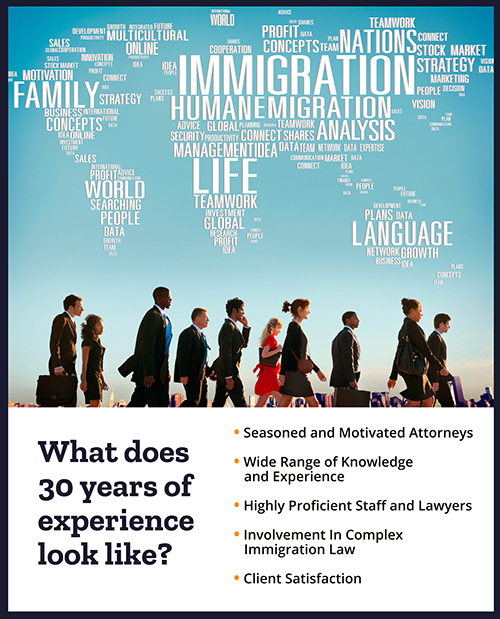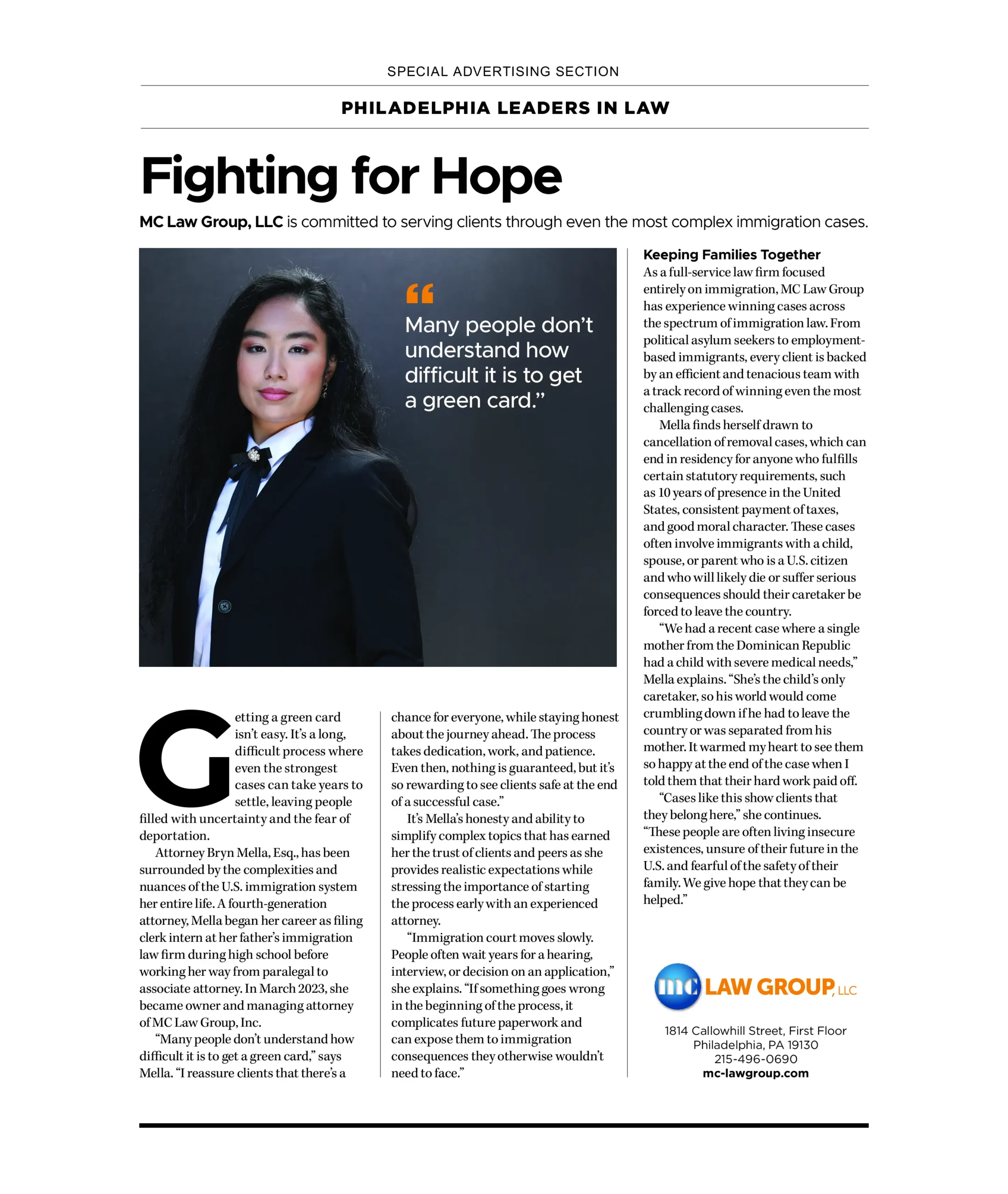As Seen In

and

Equally impressive within the legal community is Lead Attorney Bryn Mella, Esq., a standout figure at MC Law Group. Her recent feature in Forbes magazine sheds light on her dedication as a 4th generation attorney. Bryn’s commitment to providing unrivaled legal support to individuals grappling with immigration complexities is a testament to her deep-rooted family legacy in law and her unwavering devotion to upholding the principles of justice and equality for all.
Can a Lawyer Help With My Immigration Issues?
 The Philadelphia immigration lawyers at the MC Law Group, LLC are committed to those who need immigration assistance in the area. We understand that the U.S. immigration system is complex. There are families that need to bring loved ones into the country and employers who need help to sponsor foreign employees. We are a full-service law firm that offers a wide range of knowledge and experience in all types of immigration cases, including family, employment, business, student, fiancé(e), and visitor-based visas, as well as green cards, citizenship, asylum applications, and deportation defense.
The Philadelphia immigration lawyers at the MC Law Group, LLC are committed to those who need immigration assistance in the area. We understand that the U.S. immigration system is complex. There are families that need to bring loved ones into the country and employers who need help to sponsor foreign employees. We are a full-service law firm that offers a wide range of knowledge and experience in all types of immigration cases, including family, employment, business, student, fiancé(e), and visitor-based visas, as well as green cards, citizenship, asylum applications, and deportation defense.
Our attorneys are highly proficient in practicing and appearing before the Department of Homeland Security and its components, U.S. Citizenship and Immigration Services (USCIS), U.S. Immigration and Customs Enforcement (ICE), the Immigration Courts, the Board of Immigration Appeals (BIA); and the courts of all levels.
We know that these processes are often difficult to understand or manage. Clients are urged to consult with our legal team today to learn about the services we provide. Because we handle many different issues that pertain to immigration, we welcome clients who need help in more than one area. We can help a family or company remain safe and on the right side of the law. We are also strong advocates for anyone who must navigate the immigration courts.
How Does the Firm Handle Immigration Issues?
When we take on an immigration case, we can help with the following:
- Family-based immigrant visa petitions/employment authorization/travel documents
- Employment-based immigrant visa petitions and labor certifications
- National interest waivers
- Religious immigrant and non-immigrant visa petitions
- Employment-based non-immigrant visas
- E visas
- J-1 waivers
- Extensions of stay
- Political asylum
- Deportation and removal
- Citizenship and naturalization
Our clients might approach us in an emergent situation that requires our advice and services. We can help clients who need help with their business and provide information about special waivers that may be allowed by the U.S. government.
For non-emergent issues, we ask that requests be made as soon as possible. We want to ensure that visas are processed in a timely manner. When someone has been hired to come to the U.S., that application needs to be submitted promptly. The same is true of religious organizations that travel to the U.S., as well as companies that plan to transfer employees and students who are planning to study in the country.
Does the Firm Assist Employers?
When employers want to sponsor workers moving to the U.S., they can come to us for assistance with sponsorship and visa applications. Visas such as H-1, H-2, L-1, TN, O-1, and P-1, can be handled through our office, which can be complex. Clients should let us know what is needed so that we can begin to build a file for the application. In many cases, we need supporting documentation. We help clients with the following types of employment-based visas:
E visa: This visa may be needed for certain types of commerce, providing our clients with information that will help them complete each type of application. Clients may need to bring their investors to the U.S. At the same time, we can work with an employer who owns a business, works outside of the country, or needs to enter the country for work reasons.
We can also create the best business plan for each company by explaining why certain visas are needed, as well as complete applications and expedite them through the system. For example, E visas are used for traders or investors who are performing some type of work in the U.S. because they own a business or have invested in-country. If new investors or partners need to travel to the U.S., we need to get started on their application immediately.
B-1 visa: This visa can be used for business visitors who are meeting with clients or co-workers. For example, someone who works abroad may need to visit for a few days because they have clients who are in the U.S. This situation requires a simple visa with an expiration date.
H-1B visa: This visa can be used for people who have special skills that are immediately needed or work in specialty occupations.
H-2B visa: This visa can be used for seasonal workers who are not in the agricultural industry. These workers may need to come to the country every year for special events or services, but they do not necessarily have special skills.
TN visa: This visa is for those who are visiting from Mexico and Canada on business. This visa was created as a response to the North American Free Trade Agreement (NAFTA). So long as these workers have a license or degree that shows they can do the work, they can quickly obtain a visa. These workers do not need to deal with any quotas or limitations because they are North Americans.
L-1 visa: This visa is designed for those transferred intracompany and shows that the worker has an established relationship with the employer and must transfer to the U.S. This situation is different from those who have just been hired and sent to the country. Companies that have multinational offices should consider these visas any time they promote workers or change the structure of their business.
H3 visa: This visa offers passage for someone who must complete their training in the U.S. Presumably, these employees will go back to their home country once their training is complete. If they are going to stay, the employer must apply for another sponsored visa or extension of stay.
F-1 visa: This visa allows for student work authorization. This is helpful if someone is studying in the U.S. and also wants to work. This is different from a student who is simply in the country to go to school.
O-1 visa: This visa is used for individuals with extraordinary ability in the science, arts, and athletic fields.
It is important that clients reach out to us as soon as possible to determine the type of visa needed. We need to review each case and all the appropriate documentation.
What About Family-Based Visas and Documentation?
When families would like to bring their children, siblings, spouses, and parents to the U.S., they have access to the immediate relative visa. We can show that these relatives fall into this category, are ready to travel, and meet the basic requirements of the visa program. Because there is an unlimited number of visas in this category, we can complete an application for anyone else in the family who would like to come into the country. The following are additional types of family-based visas:
K-1 visa: Also called the fiancé(e) visa, it can be used when the applicant wants to bring their future spouse to the country.
K-3 visa: This visa can be used for an overseas spouse who does not meet the requirements for the immediate relative visa.
K-4 visa: This visa will be used for children who do not meet the requirements.
V visa: This visa allows someone to bring a spouse or child from overseas to the U.S. before they are given resident alien status. This might be especially important if the country they are leaving is considered dangerous.
What are National Interest Waivers?
A national interest waiver is different from a traditional business sponsorship because the applicant does not need to show that they have an offer for employment. These people can petition on their own and show that their arrival in the U.S. to find a job is in national interest. For clients who seek a national interest waiver, we can build a case for them and make the process easier. Having a lawyer handle the application prevents errors or confusion.
Are There Religious Visas?
The R-1 visa is designed to help temporary workers who are operating on behalf of a recognized religious organization. The denomination or organization can request an R-1 visa for their workers. An R-2 visa is available for spouses and children who plan to accompany workers in the U.S. We can compile all the paperwork, ensure that the client understands who qualifies, and help them obtain the visa. Clients should be aware that the R-1 visa is a temporary visa. Someone who is moving to the country to work on behalf of a religious organization should use a traditional employee visa.
What is a J-1 Waiver?
A J-1 waiver is useful for people who have been in the U.S. on an exchange visa. A disadvantage of exchange visas is that students must go back to their home country for two years before they can come back to the country to work. The J-1 waiver program allows exchange students to avoid the two-year home country residency requirement. Using the waiver, these students can obtain jobs in the U.S. and work immediately. Students or their employers can contact us to help them obtain a J-1 waiver.
Are There Visas for Special Circumstances?
There are special visas and programs available, including an extension of stay and a battered spouse visa. For example, someone who is in the U.S. on a visa can extend their stay because their visa is about to expire, even though their trip must continue. This may be needed under the following circumstances:
- The worker had their contract extended or their work is not completed.
- A student was accepted into a prestigious program or school and must stay in the country longer.
- Someone who is traveling on a visitor visa needs to extend their stay to complete their business.
- A worker needs to extend their visa if they have not completed the naturalization process.
- Battered spouses or their children need a visa that allows them to stay in the country, even though their family situation has changed.
When a battered spouse or child needs help, we can provide assistance. We know that this situation can be frightening, and we will create a convincing case that shows the spouse needs a new visa that will protect them and/or their children. We can petition to expedite the visa qualification process, and we will keep our clients updated while they wait for a decision. We can also help our clients avoid deportation while they are waiting for a special visa.
When it becomes apparent that a trip needs to be extended, clients should approach us for help if they petitioned for their visa. If the business sponsored the visa, we ask that company managers, owners, or executives come to us for assistance. We can file for an extension of stay while we work on the appropriate visa.
Can the Firm Assist with Citizenship?
The process for applying for citizenship can be complicated. We will work with our clients to fill out applications and go through the process as carefully as possible. We know that U.S. citizenship is one of the most important things that members of a family obtain. Therefore, we will work with our clients to understand what everyone is required to do. This process can be even more complex if some children in the family were born outside the U.S. and others were born in the country. We know that this can make things even more confusing for a family, and we will help them understand which steps they need to take.
How Does the Firm Support Families of Deportees?
Families that are going through a deportation or have children who are eligible for deferred action should contact us as soon as possible. Our lawyers will reach out to anyone who has been detained, or we can work with the family because they are not yet documented properly. This process can be confusing for the family, but we will work to stop the deportation process and ensure that our clients receive the appropriate visa so that they remain in the country.
Because the immigration process can be complicated, we know that some families might have missed or forgotten certain items of information that should have been submitted. We will help each family obtain the documentation they need. Additionally, we can help families apply for the Deferred Action for Childhood Arrivals (DACA) program, which allows children to go to school while their families work out any immigration issues. This program is extremely important when older children are trying to receive the education that their parents and families worked hard to provide.
Can the Firm Help Those Seeking Political Asylum?
According to the U.S. government, anyone who is applying for asylum must satisfy the following requirements:
- Currently reside in the U.S.
- Be in danger of persecution if they return to their home country at any time because of a force the government cannot or will not control, or
- Be in danger of persecution from the government itself or a particular social caste.
We know that clients are often reluctant to reach out to the government for help, and we will stand in their stead. Hiring a lawyer helps everyone in the family remain safe. We also work with persecuted clients to help them bring family members to the country if they need that service. As lawyers, we understand the process, know how to complete the forms, and will attempt to expedite the process as much as possible. We know how to work with different government agencies on these processes, and we will give our clients progress reports as we work toward their needed political asylum.
Philadelphia Immigration Lawyers at the MC Law Group, LLC Help Clients with a Range of Immigration Issues
When you are facing immigration and visa issues, reach out to the Philadelphia immigration lawyers at the MC Law Group, LLC We provide services for families, businesses, students, those seeking asylum, and visitors. Call us today at 215-496-0690 or contact us online for a free consultation. Located in Philadelphia, we serve clients throughout the tri-state area, including Pennsylvania, New Jersey, and nationwide.




